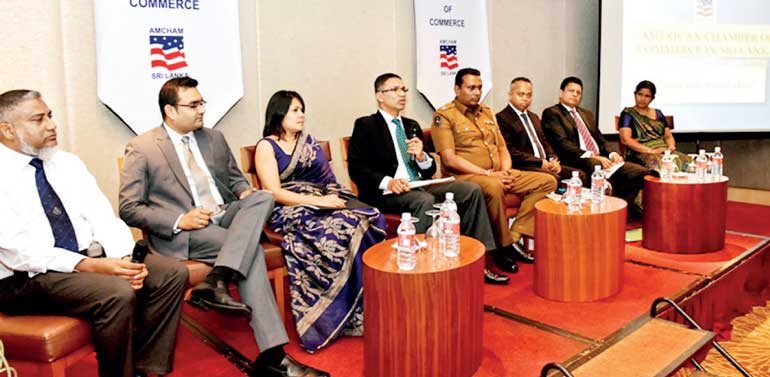Monday Mar 02, 2026
Monday Mar 02, 2026
Thursday, 10 December 2015 00:52 - - {{hitsCtrl.values.hits}}
 Seated from left: Customs Consumer Protection Unit Deputy Superintendent Ashrof Samzudeen, GalxoSmithKline Director Sales Dr. Kusal Senanayake, Microsoft Sri Lanka Compliance Manager, South East Asia and New markets, Attorney at Law Aromi Silva, Ceylon Tobacco Company Country Security and Anti Illicit Trade Manager Wing Commander (Rtd) Sanjaya Fernando, Police Spokesperson ASP Ruwan Gunasekara, Associated Motorways General Manager Prasantha Waidyaratne, Attorney-at-Law Sudath Perera, Consumer Affairs Authority Director Consumer Affairs and Information Chandrika Thilakaratne
Seated from left: Customs Consumer Protection Unit Deputy Superintendent Ashrof Samzudeen, GalxoSmithKline Director Sales Dr. Kusal Senanayake, Microsoft Sri Lanka Compliance Manager, South East Asia and New markets, Attorney at Law Aromi Silva, Ceylon Tobacco Company Country Security and Anti Illicit Trade Manager Wing Commander (Rtd) Sanjaya Fernando, Police Spokesperson ASP Ruwan Gunasekara, Associated Motorways General Manager Prasantha Waidyaratne, Attorney-at-Law Sudath Perera, Consumer Affairs Authority Director Consumer Affairs and Information Chandrika Thilakaratne
In collaboration with leading multinational organisations, the American Chamber of Commerce (AmCham) Sri Lanka recently concluded a media briefing to address the challenges and consequences posed by the illegal trafficking of counterfeit goods. This media briefing is part of the ‘Stay Safe from fakes’ campaign and marks the first step in a three part Capacity Building Workshop series designed to educate the public and share knowledge with the law makers on the issue of violations of Intellectual Property Rights (IPR).
Top companies affected by the counterfeit trade; Associated Motorways (AMW), Ceylon Tobacco Company (CTC), Microsoft and pharmaceutical industry representatives together with Sudath Perera Associates, Sri Lanka Police, Sri Lanka Customs and Consumer Affairs Authority partnered for this event. The briefing addressed comparative approaches to legislative, national, regional and international issues, techniques of customs investigations, how the judiciary indict wrong doers and the necessary synergy of services to be addressed respectively.
Speaking on this initiation, Consumer Affairs Authority Director Consumer Affairs and Information Chandrika Thilakaratne said, “The costs and negative effects of counterfeit products on all stakeholders are broad and numerous – ranging from lost taxes, royalties and other revenues, loss of goodwill and reputation, reduced incentive to innovate and invest, lower employment, etc. It has been recorded that over 750,000 jobs are lost annually due to counterfeits on a global scale. It is therefore fundamental that we, as a country take steps to enforce strong civil and criminal laws to protect IPR if we are to continue to foster innovation and creativity, safeguard consumers, and drive economic growth.”
Counterfeiting is a global problem fuelled by socio economic variables such as poverty, ambivalent consumer attitudes towards IPR, the involvement of criminal networks and easy-access to illegal goods. Ceylon Tobacco Company Country Security and Anti Illicit Trade Manager Wing Commander (Rtd) Sanjaya Fernando highlighted that the estimated loss of revenue to the country resulting from illicit cigarettes is approximately Rs. 2 billion a year. Further, high criminal organisations are often attracted to cigarette smuggling as it is considered to be high-profit making with low risk. It’s a flourishing industry, for which when smugglers are caught (repeat offenders), the punishments are very lenient. Furthermore, there is no mechanism to track offenders once caught to ascertain if they are continuing with the trade.
Available research estimates that 25%-30% of the medicines supplied in developing countries are either substandard or counterfeit. Many forms of legitimate medicines have been counterfeited for a multitude of reasons including the lack of overheads available for quality control and the ease of inserting these products into the distribution chain explained a representative of the pharmaceutical industry.
Software Piracy is another growing problem due the general misconception that genuine software is very costly remarked by Aromi Silva, Attorney at Law, Compliance Manager, South East Asia and New markets, Microsoft Sri Lanka. She further explained that pirated software adversely impacts new technology innovations and highlighted that pirated software installation is a key reason for online fraud and cyber-crime, which is increasingly putting businesses and government at cyber-security risks.
Substandard and counterfeit goods pertaining to these industries are a serious issue that impacts Sri Lanka – a developing economy, the varying industries as well as the consumers around the world.
The counterfeit automobile spare parts industry thrives due to poor customer awareness on the dire consequences. The safety of you and your family should never be compromised for a short term cost saving, explained Associated Motorways General Manager Prasantha Waidyaratne. If ever a customer is in doubt of the spare parts used on their motor vehicle, our company representatives are more than willing to help.
In his address, Customs Consumer Protection Unit Deputy Superintendent Ashrof Samzudeen said, “Counterfeit seizure in Sri Lanka is around 8 % annually. Given the negative impacts posed by the counterfeit trade, we must acknowledge it as a serious legal offence and work together in creating awareness and demand for regulations to combat the counterfeit trade.”
The effective protection and enforcement of IPR is in the interest of all; the country, legitimate companies and consumers alike. AmCham is therefore committed to developing effective strategies to combat counterfeit and smuggling to protect business, consumers and the general society against harm. AmCham encourages all organisations to continue to work with all interested stakeholders, including creators, right holders, and public interest groups, to ensure that their practices are transparent, fully consistent with the democratic values and contribute towards combating counterfeits on a large scale.